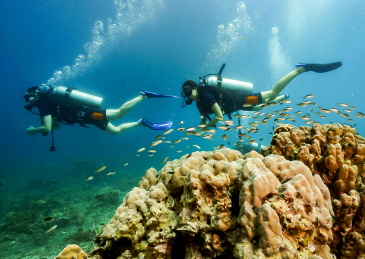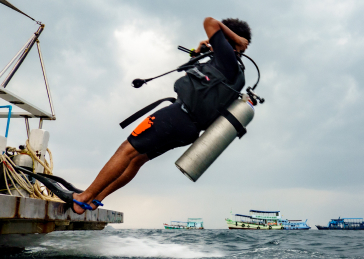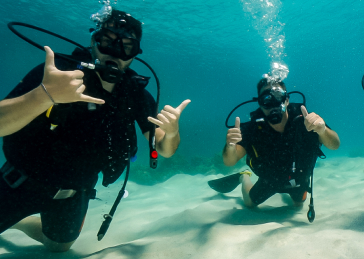14th June 2024
Non-swimmers can also enjoy scuba diving in Koh Tao, thanks to specialized programs designed for their safety and enjoyment.
Being a strong swimmer is not a prerequisite for exploring the underwater world; you just need to be comfortable in the water.
Koh Tao has beginner-friendly dive sites with calm conditions, making it the perfect place for your first scuba dive.
The choice of dive school is critical; look for experienced instructors and a school that caters to non-swimmers.
Get ready to be captivated by the rich marine life in Koh Tao, from vibrant fish to breathtaking coral formations.
Start Your Underwater Adventure: Scuba for All
Imagine diving in beautifully clear waters, surrounded by an array of colors from various marine life. This dream is not exclusive to expert swimmers. In Koh Tao, the underwater world is open to everyone, even if you have never swum before. Let’s explore how non-swimmers can safely and enjoyably uncover the underwater gems of this tropical paradise.
Exploring the Ocean without Knowing How to Swim
The idea that only those who can swim can scuba dive is a misconception that we’re here to dispel. The try scuba diving programs in Koh Tao have been developed to include non-swimmers, providing an opportunity for everyone to experience the wonder of the sea. The important thing is being comfortable in the water, and the diving schools here are skilled at helping you find that comfort zone.
Discovering the Sea’s Treasures is for Everyone
The diving community in Koh Tao is incredibly welcoming. It’s a place where no-one cares about your background, and the ocean becomes a place of exploration for everyone. With expert instruction, even those who’ve never swam in a pool can experience the marvels of the Koh Tao oceans. So don’t be concerned if swimming isn’t your thing. The buoyancy jacket you will be wearing will ensure you remain on the surface when you need to and will help you stay floating mid water when you are down there.
Getting Your Feet Wet: An Introduction to Scuba Diving for Non-Swimmers

“How to have healthy feet in the summer …” from uoflhealth.org and used with no modifications.
Before you take to the water, there are a few basics you need to understand. Scuba diving is as much about knowing the gear and safety procedures as it is about swimming. Here’s how non-swimmers can begin their scuba diving adventure.
Beginner’s Guide to Diving Equipment and Safety
The first step is to get to know your diving equipment. You’ll be kitted out with a mask, snorkel, fins, regulator, buoyancy control device (BCD), and a tank. It may seem overwhelming at first, but your instructor will walk you through what each piece is for and how to use it.
Grasping Scuba Fundamentals Even If You Can’t Swim
Scuba diving is not about being an expert swimmer; it’s about being able to breathe and move underwater with ease. The principles of diving are centered around controlling your breath, buoyancy, and navigation — skills that are built from the ground up in diving experiences designed for those who can’t swim.
Why Choose Koh Tao: Tailor-Made Programs for Non-Swimmers
Diving schools in Koh Tao provide courses that are tailor-made for non-swimmers. These programs focus on safety and building confidence, so you can have a worry-free underwater experience.
Picking the Perfect Dive School in Koh Tao
It’s important to choose a dive school that caters to the needs of non-swimmers. Find schools with experienced instructors who provide one-on-one attention and a course that begins with the fundamentals in a safe environment, like a shallow pool or a peaceful bay. The regular
Dive Sites for Beginners
Koh Tao is fortunate to have a number of dive sites that are ideal for beginners. These sites provide mild currents, excellent visibility, and shallow depths, giving you the opportunity to gradually get used to the underwater environment while your instructor keeps a close eye on you. Sites like Mango Bay and Japanese Gardens are ideal for those taking the try dive experience.
The Journey of a Non-Swimmer to Scuba Diver
Becoming a scuba diver when you’re a non-swimmer may seem like a stretch, but it’s a process that happens gradually. In Koh Tao, you’ll begin with the fundamentals in a secure, regulated setting, and in no time, you’ll be navigating the sea with confidence.
Firstly, it’s important to realize that scuba diving isn’t about strong swimming strokes or abilities. Instead, it’s about learning to handle your equipment, control your buoyancy, and feel at ease in the water. This is something that anyone can learn, no matter how good they are at swimming.
The instructors in Koh Tao are experts in helping non-swimmers overcome their initial fears. They are adept at creating a learning environment that is both safe and encouraging. With each small step, you will gain the confidence needed to move from shallow waters to the open sea.
Begin with a basic diver course to get used to the water and the equipment.
Learn how to breathe and control your buoyancy in a safe environment, such as a shallow pool.
Slowly move on to open water under the supervision of your instructor.
Keep in mind that the emphasis is on comfort and safety, not on swimming ability.
Customized Training and Assistance
Every prospective diver is different, especially when it comes to being comfortable in the water. That’s why dive schools in Koh Tao provide customized training. Instructors will guide you at your own speed, making sure you understand and are comfortable with each new skill before moving on.
Our custom-fit strategy ensures that you’ll never feel hurried or overwhelmed. Instead, you’ll get the support and motivation you need to grasp the basics of scuba diving. This one-on-one attention is what turns fear into self-assurance.
Guided Dives with Professional Instructors
You’ll take your first underwater breaths under the careful guidance of your instructor.
They will be right there with you, ensuring your comfort and safety throughout the dive.
Professional instructors are skilled at adapting the experience for non-swimmers, focusing on tranquil, shallow waters where you can touch the bottom if necessary.
Their presence is comforting, allowing you to unwind and fully immerse yourself in the dive.
A guided dive is not just about safety; it’s a chance to learn from the experts. Instructors will point out marine life, assist you in navigating the underwater terrain, and share advice that will enhance your dive. They are your underwater tour guides, who are passionate about the ocean.
Once you come up for air, you’ll feel an incredible sense of accomplishment. As you complete more dives, you’ll become more confident and start to feel at home in the ocean.
What’s in Store: Your Inaugural Scuba Dive in Koh Tao

Your first scuba dive in Koh Tao is an experience you’ll remember forever. It’s a cocktail of exhilaration, expectation, and a smidge of anxiety — all completely typical emotions when you’re discovering an entirely new universe.
Getting Ready and Going Over the Basics
Before you even dip a toe into the water, you’ll participate in a thorough rundown of what’s to come. Your guide will go over how the gear functions, how to signal while underwater, and what steps to take if an emergency were to occur. This is also a great opportunity to ask any questions.
Experiencing the Underwater World
As you go down, the sounds of the surface disappear, and you find yourself in a world of peace. The bright colors of the coral, the elegant swimming of the fish, and the overall variety of life is mesmerizing. It’s a sensory overload, and you’re in the middle of it all.
The waters of Koh Tao are alive with sea creatures. You may see angelfish darting through the coral, butterflyfish swimming in groups, or even a turtle munching on the algae. Every dive site has its own unique sea life, and your instructor will know the best places to go.
Getting The Most Out Of Your Underwater Adventure
To get the most out of your underwater adventure, there are a few things you should keep in mind. These tips will help you stay comfortable and make sure that you have the best experience possible.
First and foremost, remember to breathe normally and keep your cool. Your breath is your lifeline underwater, and keeping a steady rhythm will help you manage your buoyancy and movement. Additionally, you should equalize your ears frequently to prevent discomfort as you change depth.
It’s crucial to always take your time and move intentionally when you’re underwater. If you move too quickly, you could stir up sediment, which would decrease visibility and potentially disturb marine life. If you move slowly, you’ll not only save energy and air, but you’ll also have a better chance of fully taking in the amazing underwater world around you.
In addition, it’s important to stay close to your instructor and follow their lead. They’re familiar with the waters and will make sure you’re exploring the best areas while also ensuring your safety. And remember, if you’re feeling uncomfortable or need help, don’t hesitate to signal your instructor — they’re there to assist you.
So, as you get ready for your scuba diving adventure in Koh Tao, keep in mind that not being a swimmer does not mean you cannot explore the marvels of the underwater world. With proper guidance, training, and attitude, you can try scuba diving just like anyone else. Embrace the adventure, and prepare to have your mind blown by the beauty that exists beneath the surface.
Enhancing Your Underwater Experience

Scuba diving in Koh Tao is more than just diving deep into the water; it’s about changing your view of nature. Whether you’re floating above coral reefs or swimming next to sea turtles, each dive is a chance to learn and be amazed by the marine life that flourishes under the sea.
How to Increase Your Comfort and Enjoyment While Scuba Diving
To have the best possible scuba diving experience, it’s important to be comfortable. Start by making sure your diving suit fits properly and provides the right amount of thermal protection. If your suit is too tight or too loose, it can be distracting and could even affect your ability to control your buoyancy. Also, practice breathing through your regulator before you dive. It might feel weird at first, but taking slow, deep breaths can help you relax and use less air.
One more suggestion is to keep a neutral buoyancy, which means you don’t sink or float. This ability is essential for safeguarding the fragile marine ecosystem and for your own pleasure. Your instructor will assist you in mastering this skill, which includes adjusting the amount of air in your BCD and learning how to regulate your breathing.
Keep Diving: The Next Steps in Scuba Education
Think about signing up for an Open Water Diver course to become a certified diver.
Take formal swimming lessons to ensure you can take the swim test in the open water course.
Relax and remember most people can float without moving in a swimming pool with the right training.
Always keep learning and practicing to enhance your skills and safety awareness.
Once you’ve experienced the thrill of scuba diving, the learning doesn’t end there. Continuing your scuba education can open up new opportunities to different dive sites, advanced diving techniques, and even career opportunities in the diving industry. With each new certification, you’ll build confidence and expand your diving capabilities.
Don’t forget, scuba diving is also about the community. Connect with other divers, exchange stories, and gain insights from their adventures. The world beneath the waves is immense and packed with marvels, and there’s always a new mystery to uncover.
Embarking on a scuba diving journey in Koh Tao could ignite a lifelong love. Let the sea inspire you to continue your exploration.
Common Questions
Do you have questions? Don’t worry, you’re not the only one. Here are some of the most frequent questions from non-swimmers who are interested in scuba diving in Koh Tao.
Is it really possible to scuba dive even if I don’t know how to swim?
Yes, it is! While knowing how to swim well can be beneficial, it’s not a requirement for a try scuba diving experience. Dive schools in Koh Tao accommodate non-swimmers by offering specialized training that emphasizes being comfortable in the water and understanding how the scuba equipment works. With the appropriate instruction, non-swimmers can safely experience the beauty of the underwater world.
The key is to feel at ease in the water and to voice any worries to your instructor. They are prepared to assist you in overcoming any anxieties and to guarantee that you have a safe and pleasant experience.
It is important to note that if you wish to take the open water course in Koh Tao and everywhere else in the world for that matter, you’ll need to be able to swim 200m unaided, or 300m with a mask, snorkel and fins. Most people can do this after a few formal swimming lessons which are available in Koh Tao.
What kind of sea creatures can I spot in Koh Tao?
The ocean around Koh Tao is a sanctuary for all kinds of marine animals, providing a wide range for divers to see. You’re likely to come across a variety of tropical fish such as angelfish, butterflyfish, and parrotfish. There’s also a chance you’ll swim by some bigger creatures like barracudas, stingrays, and maybe even a whale shark from time to time. The colorful coral reefs themselves are full of life and activity.
Every dive site in Koh Tao has its own unique features and creatures. Your dive instructor will choose the best spots for the current season and conditions, maximizing your chances of having unforgettable experiences.
How do I pick a diving school as a non-swimmer?
Selecting the appropriate diving school is critical. Search for schools with good reviews, particularly from non-swimmers. Make sure they offer beginner courses and place a high value on safety with certified instructors. If you don’t speak English as your first language, it’s also helpful to find a school that offers instruction in a variety of languages.
What kind of training will I receive?
You’ll start with basic training in a controlled environment, such as a shallow calm bay, where you can stand up if needed. You’ll learn how to use the equipment, control your breathing, and manage your buoyancy. After mastering these skills, you’ll progress to the open water dives, closely supervised by your instructor. The maximum depth you’ll go to will be 12m.
The training approach is usually practical, with a heavy focus on safety and ease. Your trainer will be there to support you throughout the process, making sure that you grasp and are at ease with each new ability before proceeding. For those interested in Discover Scuba Diving on Koh Tao, Thailand, this hands-on approach is particularly beneficial.
Can non-swimmers safely scuba dive?
Absolutely, non-swimmers can scuba dive safely as long as they are diving with a reliable school and experienced instructors. Safety measures are established to manage any possible situations. It is crucial to pay attention to your instructor, communicate honestly, and adhere to the rules given during your training.
Diving for non-swimmers In Koh Tao is a unique experience that allows individuals who are not proficient swimmers to explore underwater wonders. With professional guidance and proper safety measures in place, non swimmers can enjoy a Try Dive in Koh Tao, getting a taste of diving and witnessing the awesome marine life that the island has to offer.divi
Dive with LBD: Your Gateway to Underwater Exploration
Whether you’re a curious beginner or a seasoned pro, our school is your portal to the wonders of scuba diving. Join us into the world beneath the waves.
READY TO GET STARTED?
Check our diving courses in Koh Tao



